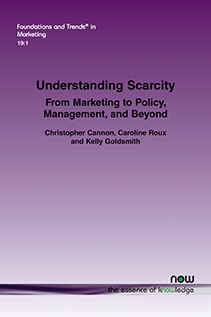Understanding Scarcity: From Marketing to Policy, Management, and Beyond
By Christopher Cannon, Shidler College of Business, University of Hawai‘i at Mānoa, USA, crcannon@hawaii.edu | Caroline Roux, John Molson School of Business, Concordia University, Canada, caroline.roux@concordia.ca | Kelly Goldsmith, Owen Graduate School of Management, Vanderbilt University, USA, kelly.goldsmith@vanderbilt.edu
Abstract
In a world where resources are increasingly perceived as scarce, understanding the nature of scarcity and its profound effects on human behavior has never been more critical. This monograph delves into the multifaceted dimensions of scarcity—its antecedents, manifestations, and consequences —inviting readers to explore how scarcity shapes our decisions, relationships, and societal structures. From the psychological implications of time and money scarcity to the interpersonal dynamics that arise when individuals navigate differing levels of resource availability, this work unravels the complex ways in which scarcity can influence thinking and behavior. Scarcity can drive innovation, spur creativity, and even foster resilience; yet, it also carries the weight of negative consequences like impatience and selfishness. This monograph examines the delicate balance between abundance and scarcity, challenges conventional notions, and illuminates pathways for future research. Through illuminating the rich landscape of scarcity, the authors offer not only theoretical insights but also practical implications for marketers, policymakers, and everyday individuals seeking to thrive amidst resource constraints.
Understanding Scarcity: From Marketing to Policy, Management, and Beyond
Understanding Scarcity: From Marketing to Policy, Management, and Beyond explores the intricate relationship between scarcity and consumer behavior, drawing on decades of research across marketing, economics, and psychology. Marketers have long utilized scarcity tactics such as “limited time” or “limited quantity” promotions to boost demand, rooted in the principle that “scarcity increases value”. The 2007-2009 Great Recession ignited a fresh wave of interest in scarcity as more than just a promotional tool—it became a complex psychological state driven by macroeconomic factors, personal experiences, and even subtle environmental cues. This monograph captures that shift, examining scarcity as both a chronic condition and a mindset that influences every stage of consumer decision-making.
This monograph highlights how scarcity can be triggered by anything from financial deprivation to simple social comparisons. The authors illuminate the profound impact of scarcity on consumer motivation, willingness to pay, and effort expended to acquire products. Drawing from a diverse range of findings, this work offers novel implications for public policy, marketing strategies, and management decisions. The authors not only review historical and contemporary research on scarcity but also offer a forward-looking agenda for future studies. Perfect for scholars and practitioners alike, this monograph offers a rich understanding of how scarcity shapes behavior, and how businesses and policymakers can harness power to better serve their audiences.
